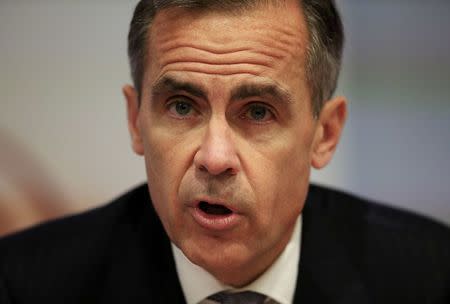BoE's Carney says Brexit fears could pose current account deficit risk
By David Milliken and Huw Jones
LONDON (Reuters) - Worries about Britain's EU membership and the global economy could test the "kindness of strangers" who fund the country's hefty current account deficit, Bank of England Governor Mark Carney said on Tuesday.
Britain's economy has grown strongly over the past couple of years but the forthcoming vote on its membership of the European Union has emphasised some of its vulnerabilities.
Near the top of the list is Britain's current account deficit, which at 3.7 percent of gross domestic product is large by international standards.
It could be made worse by a weakening global economy or if investors wanted greater returns to hold British assets, Carney told British lawmakers in response to questions about the EU referendum.
"The global general environment has become much more febrile, much more volatile, and relying on the kindness of strangers is not optimal in that kind of environment, and that's what is the case when you're running a 4, 4-1/2 percent (of GDP) current account deficit," Carney told lawmakers.
"And secondly, the possibility of a risk premium being attached to UK assets, because of certain developments, exists and that plays into the riskiness of the situation."
A plunge in the pound versus the dollar has added to lingering unease about Britain's ability to fund such a large current account deficit in the long-term.
But Carney said there were grounds for hope. Britain might soon see better returns on investments in an improving euro zone economy, which would help to cut the current account deficit.
The BoE has previously said it will watch carefully for signs that Britain - which suffered balance of payments trouble in the 1960s and 1970s - might find it harder to cover its shortfall with the outside world due to concerns about the referendum.
Carney said the BoE would have measures in place to protect financial stability if Britain opts to leave the European Union after the referendum.
The booming buy-to-let market for rental properties was one of the BoE's biggest worries about financial stability, but Carney said the Bank wanted to assess the impact of government tax changes before taking further action on the market.
Carney reiterated that the conditions for an interest rate hike were not in place yet and he said he would decide by the end of this year whether he would seek to serve as governor for longer than the five years he originally agreed to stay in the job.
(Additional reporting by Ana Nicolaci da Costa and William Schomberg, writing by Andy Bruce Editing by Jeremy Gaunt)




